
Library
 Library |
compiled
by Tom Brennan
last
updated: May 17, 2025
biography
information and research from Dan Matovina's "Without You, The Tragic
Story of Badfinger" and Robin Kats's July 10, 1976 article in the U.K.
paper "Sounds";
thanks to Paul Nyman for record scans and LP cover scans; thanks to Mark
Perkins and Stephane Fremon for single and picture sleeve scans;
excerpts of Bob Jackson interview throughout this page from Jesper's
Badfinger News
for full interview, visit Jesper's Badfinger News, Bob
Jackson
interview, part 1
Roger Lomas quotes are from an interview that can be found on http://www.cwn.org.uk/blackroom/story-so-far/9905-roger-lomas.htm
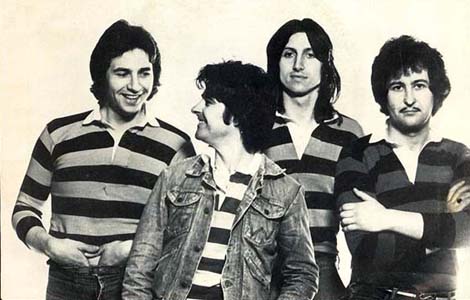
line-up
#1: John Wilson, Tommy Evans, Bob Jackson, Dave Powell
How the Dodgers were formed
John Wilson and drummer Dave Powell were the nucleus of the band Nimbo
throughout their ill fated career. Signed with Pye, they released a ballad
called Maizie Jones and another called When The Swallows Fly.
They did a lot of work in Germany where they were spotted by one Trevor
Churchill. Churchill got them out of Pye and signed them to the promising
British Motown label. After releasing singles Living Without You
and I'm Losing You, the group now renamed the Rockits fizzled
away, then Tim Boyle and Barry Marshall got the surviving Rockits signed
with Island. Half way through their demos, their bassist quit. Boyce was
already old mates with Tommy Evans from the Iveys days and had been
playing Evans the new group's material. Evans was impressed and became
familiar with the songs of John Wilson. He agreed to help out the new band
by doing the bass for their demos. To round out things he brought in Bob
Jackson who had been with Badfinger in their last days. A group gelled.
After an optimistic Christmas they went into the studio with Muff Winwood
and cut four tracks, three of John's and one of Tommy's. Island picked the
single and the drummer Powell picked the group's name from a Beano comic.
Remember Roger the Dodger?
![Roger the Dodger [The Beano, all characters and images are (c) D.C.Thomson]](RogerDodgerlogo.jpg)
Bob Jackson: Tom rang me directly and said that Tim
Boyle knew this guy at Island Records who was getting a deal -- John
Wilson. They didn't know what sort of context to put him in. He was in a
band called The Rockits and they felt that he was good, but the rest of
the band weren't really up to much. So Tom had rang me and we went down
together to see what was going on. We met up with John and the drummer
Dave Powell, those were the two guys remaining and we did our initial
rehearsals in Island's Maida Vale studio. We got together; we were
introduced. We talked about stuff and John played some of his songs. We
played some of our songs and just started jamming, and I think by the
end of the day we thought, "yeah, there might be something in this."
Island were already interested and when we were put together, I suppose
that just firmed up the package. So we were offered this thing, "well,
you can work with Muff Winwood." We basically went into the studio with
Muff and we also did one or two showcase things at Island, and, of
course, we started getting our stage set together as well. I think we
were on the road and recording with Muff at the same time, which only
really amounted to the singles that we did and some jingles. We
certainly didn't have any great big meetings before. It was more or
less, "let's get in there and just do it." I think that the people in
charge had already decided that the song Don't Let Me Be Wrong
would be the first single.
Bob Jackson: We went along to that [demo] session with
Tim Boyle; certainly Muff had nothing to do with that at all. 13 demos
were cut in a 2-day session in early 1976.
4-track demos:
01. Only Lonely (Jackson/Wilson)
02. All I Want Is You (Evans/Jackson) [tape was damaged]
03. Matter Of Pride (Wilson)
04. For Your Love (Jackson)
05. Sun's In My Eyes (Wilson)
06. Don't Let It Go (Evans)
07. Take Another Piece [with different bridge] (Jackson)
08. Love On The Rebound (Wilson)
09. How Can I Be True To Her (Wilson)
10. I Can't Live Without Your Love (Jackson)
11. I Believe In
You (Evans) [2:08]
12. Won't Forget You (Jackson) [Bob Jackson solo]
13. Mr. Music (Wilson)
thanks to Dan Matovina for list
The first gig
The Wimbledon Superpop'76 Festival with Pilot and Murray Head.
The Island singles
Bob Jackson: Okay, well, in the early stages of the band, John
would often bring a song along and just say; "look, you're gonna love
this," and then he'd proceed to sing it, "yeah, come on, let's do it;
you play this bit and these are the chords...", and before you knew it,
you had done it.
Bob Jackson: Yeah, to be fair to John, he was willing to listen. Part of
his thing is that he will try and make you feel good about yourself - he
will say, "that's great, I really like what you do; that's really good."
So he was willing to listen to our ideas, but, on balance, we still did
more of John's songs.
Bob Jackson: I would say about five or six sessions altogether. I can
remember going in there with Take Another Piece and he said,
"yeah, I really like that, but I don't like that middle-eight." We were
playing some stuff, you know, individually, and I thought "that's a bit
pompous, he only heard it once." I mean that was a bit of an instant
decision. I said "okay," and I went home and I wrote what I considered
to be a better middle-eight, which is now the existing one. And he said,
"yeah, actually that's a lot better." So I know that we met, on a number
of occasions.
Don't Let Me Be Wrong
[version 1] (Wilson) [2:35]/Get
To You (Evans/Jackson [bridge]) [2:45]
Recorded in December, 1975
U.K. on April 15, 1976 - Island WIP 6292 [ A
side label | B side
label ]
U.S. in July 1976 - Island IS-058 [ A
side label | B side
label ] [ Review
from Record World ]
Germany on 16 995AT [ PS
front ]
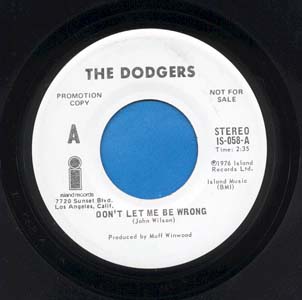
scan thanks to Mark Perkins
Tommy Evans: "At first, I didn't get very excited about the single's release but then the Island promotion team got very excited, so we got all geed up too. And we're getting good feedback from America. As you can imagine I'm still very wary about the business side. I've still not signed anything yet. The best part is the energy. We've only been together for six months and things just keep getting better and better. We have a lot more in common than I would have thought. If one of us suggests something, it's probably what the other three were already thinking."
BBC Peel Session: May 11, 1976 (broadcast: May 26,
1976; re-broadcast: July 5, 1976)
Producer: Jeff Griffin/Engineer: Mike Robinson
1. Don't Let Me Be Wrong (Wilson)
2. Just Wanna Love You (Wilson)
3. Get To You (Evans/Jackson)
4. Help Me Out
drummer Dave Powell quits
Bob Jackson called former Indian Summer bandmate Paul Hooper to replace
original drummer Dave Powell.
John Wilson, Bob Jackson, Tom Evans, Paul Hooper
U.K. Tour: to promote the second single, Just Wanna Love
You
Bob Jackson: We were doing a number of gigs, and we
toured with a guy called Steve Gibbons. He was headlining... We also did
a tour with a band called "Renaissance." I think we all got on fine. I
suppose it did really fall into two camps: me and Tommy used to hang
around together, obviously because of the Badfinger thing. If we ever
worked down south, I would stop at his place and Paul Hooper, who was
involved by this time, would stop at John's place.
We did the odd one or two [covers]. Rockers like It'll Be Me.
August 02, 1976: Penthouse Club, Scarborough
August 03, 1976: Penthouse Club, Scarborough
August 04, 1976: Samantha's, Hull
August 05, 1976: Winter Gardens, Cleethorpes
August 06, 1976: Queen's Hotel, Essex
August 09, 1976: Outlook Club, Doncaster
August 10, 1976: Tiffany's, Scunthorpe
August 12, 1976: Mr. Digby's, Birkenhead
August 13, 1976: Imperial Hotel, Blackpool
August 14, 1976: City Hall, St. Albans
August 15, 1976: Village Bowl, Bournemouth
BBC Radio
One In Concert, taped August 16, 1976
(John
Wilson, Bob Jackson, Tom Evans, Terry Williams):
opening [0:13+]
1. Another
Time, Another Place (Jackson) [3:10]
2. 24 Reasons
(Evans/Wilson) [2:52]
news about recording first LP/band introductions [0:53]
3. Matter Of Pride
(Wilson) [3:44]
4. Just Wanna Love You (Wilson) [3:06]
dedication to Mike Mansfield (he was the presenter of the U.K. music
programme, "Supersonic").
5. Down (Wilson) [4:59]
6. Don't Know What You're Doing (Jackson) [3:07]
thank you to Terry Williams [0:18]
7. Where Were You
(Wilson) [3:18]
closing [0:28]
August 18, 1976: Woods Centre, Plymouth, Devon
August 20, 1976: Garden Ballroom, Cornwall
August 22, 1976: Black Swan, Sheffield
August 23, 1976: The Spa Pavillion, Whitby, Yorks
August 26, 1976: Jubilee Hall, Burton-on-Trent
Just Wanna Love You
(Wilson) [2:47]/Don't Know
What You're Doing [version 1] (Jackson) [3:00]
U.K. on October 22, 1976 - Island WIP 6342 [ Island
sleeve | side
A DJ copy label | side
A label | side
B label ]
Germany: on Island 17 610AT
Holland: on Island 17 634AT
The Arrows U.K. TV
(aired: November 30, 1976)
(John Wilson,
Bob Jackson, Tom Evans, Paul Hooper):
Just Wanna Love You (Wilson)
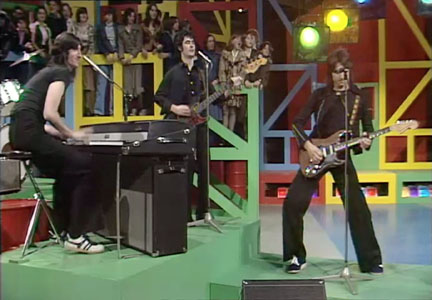
Down (Wilson)
[4:04]/Don't Know What
You're Doing [version 1] (Jackson) [3:00]
U.K. on December 10, 1976 - Island WIP 6361 [ side
A label | side
B label ]
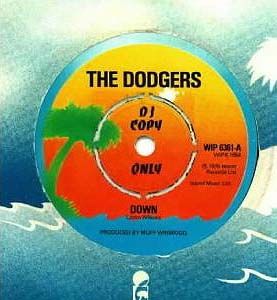
Germany on Island IS 17 610AT [ picture
sleeve | side
A label | side
B label ]
Holland on Island IS 17 634AT [ picture
sleeve | side
A label | side
B label ]
Australia on Island (Festival) K-6661 [ side
A label | side
B label ]
Supersonic
(taped: December 29, 1976; aired January 22, 1977)
(John
Wilson, Bob Jackson, Tom Evans, Paul Hooper):
Down (Wilson) [3:53]
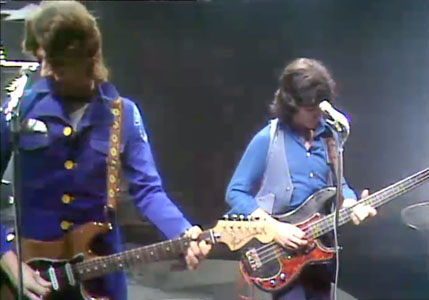
February 2-8, 1977: rehearsals
February 28, 1977: The Stud, Fulham, London
April 27, 1977: rehearsal in Ritz Rehearsal Room, 110 Disraeli
Road, S.W.15, London from 11AM-5PM - thanks to Keith
James
Tommy Evans is fired
Bob Jackson: No, I think it was a complete shock to
him. I mean the truth of the matter is, I didn't see it coming. My first
recollection is at the management office on Oxford Street. I think as we
were going up the stairs John said to me something about, "Tom's gotta
go." I was, "what are you talking about?" So, then we walk in the door
and the managers are there. He just wasn't called, and it wasn't really
discussed. It was, "we don't feel that Tom is right for the group." I
can't remember anything that he did that was extreme, but nevertheless,
they came up with this scenario: "you will have to get rid of him!" and
I said, "well, what do you mean...?" I was a bit shell-shocked, "well,
how are we gonna do that?"
So, the next time we met up with Tommy was at a rehearsal at a pub in
Islington in London and right after that rehearsal we all sat down at
the table and had a drink. I'd already explained to the others, "look, I
can't say anything about this," because I was personally torn, more than
the others were. Obviously, I'd been involved with Tommy in the past,
the bigger, deeper friendship and I didn't agree with it, but on the
other hand, what was being put to me by everyone else was "look Bob,
you've gotta think of the band, we've got an album deal sorted out." You
know, everything was on a roll. We'd already started to record at
Rockfield and John said, "they're gonna do all sorts of promotion and
maybe Tommy is a bit over the top; you know what he's like." And I was
saying, "well, yeah, John, but...." Well, I said, "what is it about him
that is that bad, because he's a very talented guy. He's a good guy,"
and all the rest. And they said, "no, he has to go." I remember saying,
"Can't we give him a warning? Can't we..." But it was like, "we're the
management. We have decided, this is what's gonna happen." Looking back,
I should have said, "well, bollocks to you. I'm gonna go, Tom is my
mate." That's really what I should have done. But I must admit I didn't.
John was sort of, "well, well... we've got to think of the bigger
picture." Paul's view was: "we have to prove that we will do whatever it
takes." I was very torn about that. I felt terrible about it. I agonized
about it for months and years to come, until Tom contacted me again. So
anyway, on the day, I couldn't say anything. I just looked down. Very
weak of me, really, but I just turned away and Paul basically said,
"sorry Tom, you're out." "Why?" "Well the management says..." And Tom
said, "Well, well... Okay. Fair enough, I hear what you're saying. Well
look, can't you give me a chance?" Paul was very unemotional about it,
because he was detached from any real long relationship and he just
said, "Sorry Tom. That's the way they've told us. That's it, mate."
Tommy just looked so ill, you know he looked awful. He just stood up and
said, "Right, I suppose that's it then," and walked out. Oh my God. I
know how it must have hurt him. Can you imagine? I felt awful. He didn't
ring me. Out of anger or whatever. And I didn't ring him, because I was
so ashamed. Not that I agreed with it, you know. I stood up for him, but
I went along with it, didn't I? And I felt terrible about that. I really
felt for him. It must have hurt his pride so much... It seemed so
illogical. You shouldn't fire people when you're working on an album.
You've already worked up the songs, the material. You gotta get back in
the studio. It's unbelievable. I don't know which of his bits they used
and which they didn't, but certainly some of his stuff was wiped out.
I was talking with Paul just the other day and he shed some new light on
it all. After we left Island, there was a lull in the work, so Paul,
John and I got a 'scratch' band together doing Beatles stuff, just for
fun - (this was way before tribute bands were around). John had met Rog
(Lomas), had got on very well with him, and asked him to be involved in
it. Tommy lived the other side of London so we began playing with Rog in
the 'Beagles' - (it was meant to be jokey). Rog played guitar, so John
switched over to bass. Although I didn't realize it then, John's
enthusiasm for all this was probably a factor in influencing the
management's point of view.
I mean there were shows where he [Tommy] was a bit 'squiffy' in
performance. But I'll put it like this, what is noticeable to guys
onstage wouldn't have been noticeable to people in the audience. He
always did his job. We're probably all guilty of having one drink too
many on occasion. I can't remember any arguments between him and them.
Roger Lomas: "I joined The Dodgers, a local band that
had a deal with Island Records. At the time the original bass player in
the band was the bassist from Badfinger. He left and I took over on
bass, which I shared with the other guitarist, because I didnít want to
be playing bass all the time. Some of the members were from Coventry and
the other half from London. We did an album for Polydor and had a few
singles out, but the timing was bad. The band was a cross between The
Beatles and Bad Company, which was unfortunate because punk was big
then."
Paul Hooper's theory was that Tommy was used as a scapegoat by the
management because of the band's lack of success.
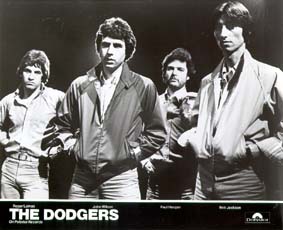
Roger
Lomas, John Wilson, Paul Hooper, Bob Jackson
Love On The Rebound LP (released: May, 1978)
Sessions began in early April 1977 at Rockfield Studios with
producer (and engineer) Pat Moran
Tommy Evans's vocals and bass lines were erased and replaced by new member
Roger Lomas.
Bob Jackson: The reason we got Pat
Moran was that we were directed into that by the management who said,
"we've got the perfect guy to do this album for you. Let me tell you a
little bit about him..." And straight away I said: "I know him" and Paul
Hooper said "I think I do as well." In fact, I'd played in a band
context with him once, although briefly. So, anyway, what it really
amounted to was they got Pat on a very cheap deal; it was all about
money. We knew what his productions were like, specifically his
productions at Rockfield. Because we'd heard the stuff, and we knew that
he was very much a kind of technician, we knew, straight away that the
live sound, that crunchy sound wouldn't translate. Everything was kind
of clean and clinical. Paul and I said that we knew about him and he was
a lovely bloke, but we didn't feel he was right for this project. But
again it was a bit like the clothes or Tommy's departure: "Well, this is
what's gonna happen." I think that album really reflects Pat's sort of
tastes. That's what it amounts to. It didn't reflect the reality the
group was about. Well, he [Pat] picked all of the material. He picked
the kind of sound that would be used, for the most part. He'd use the
old line "don't worry, when it comes to the mix, it'll be alright."
Sometimes, it's hard to know whether to trust your own judgment or not.
One of the things that Pat used to do was to monitor the stuff really
loud, so you get this feeling it's powerful. You come out wondering,
"well, is it or isn't it?" It sounds meaty, but of course, later on you
get a cassette and it sounds weedy, it sounds too clinical. I think we
were just trying to be optimistic. I think John said, "well, it's not so
bad, actually." And I was a bit more, "well. I'm not sure, this doesn't
sound right to me." In fact, you know it's not right, really. But you
kind of act like you've just done something important. You've been
through this whole process. All these problems: kicking your mate out,
going through all this pain. You're thinking, well, you wanna think it's
going to be good, of course you do.
Bob Jackson: What I realized was that there was this publishing
deal that they had made me sign before the first album. They'd said:
"Sign songs to us now, later on we'll give you a publishing deal". I
said, "I don't know whether I want to do this. Why should I sign this
away now?" Of course their arguments, which are the typical management
arguments were: "Well, we're a team now. We're all helping each other
aren't we?" So anyway, against my better judgment, I signed the deal.
When I realized they were trying to get rid of me, there was only a few
months until their contract started. I didn't particularly want to be
signed to them. But at the same time, that promise of that advance money
was really all I had to look forward to. So I didn't confront them
immediately. I felt that if I met up with them too early, they would
probably say: "Bob, we don't want your publishing anymore, and we're
canceling it." So after the time went by, I fixed up a meeting with
them. Paul Hooper came as well, and we took a tape recorder and we put
it in a bag. I rang up ahead and said: "I wanna come down and talk about
the situation." And then we confronted them with it all. They wanted him
[Paul] out as well, because he agreed with what I'd said about
everything. And at the same time, John was into them for a lot of money.
He'd been borrowing and they advanced Rog Lomas a lot of money, so they
wanted to keep them. Well, the management was saying, "that's it; we
don't want the group any more, but we are offering Rog and John
something." We basically said: "well, it's plain the way you feel, and
under the circumstances, we wouldn't wanna carry on anyway." I then
called a band meeting at my house, and we thrashed it out. I remember
John saying something like: "alright then, if you and me stick together,
we'll carry on and I'll get rid of the management." He was basically
saying, "not you, Paul." I just said, "John, I can't do that. Paul's
been fighting this thing with me. I just couldn't do that." So that was
it. That was the finish, in that room. The post-script to all this is
that years later and despite a dodgy lawyer, I eventually did win all
the money I was owed. Don't you just love a happy ending!
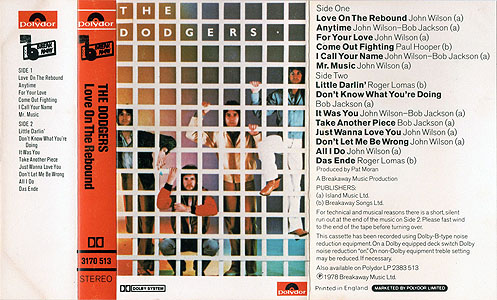
UK: Polydor LP 2383 513
UK: Polydor cassette 3170 513 [ side
1 | side 2
]
Side 1:
Love
On The Rebound (Wilson) [3:37]
vocals: John (plus Bob and Roger)
Bob Jackson: John's influence. Our original idea with that group was
British pop, It was just that John started bringing along some of those
types of tracks, saying, "well, this will be good live! I'm not sure it
had any tremendous reaction actually.
Anytime
(Wilson/Jackson) [3:43]
vocals: John (plus Bob and Roger)
For Your Love
(Jackson) [3:47]
vocals: Bob (plus John and Roger)
Come Out Fighting
(Jackson/Hooper)* [2:56]
vocals: John and Bob (plus Roger)
I Call Your Name
(Jackson/Wilson) [3:19]
vocals: John and Bob
Mr. Music (Wilson)
[2:52]
vocals: John (plus John, Bob, Roger and Paul)
Side 2:
Little
Darlin' (Lomas) [2:51]
vocals: John (plus Bob and Roger)
Don't Know What
You're Doing [version 2] (Jackson) [3:50]
vocals: Bob (plus John)
Medley [4:54]:
It Was You
(Jackson/Wilson) (2:32)
vocals: Bob and John
crossfades into...
Take Another Piece
(Jackson) (2:22)
vocals: Bob (plus John and Roger)
Bob Jackson: "...I mean it's hacked around to death."
Medley [6:37]:
Just Wanna
Love You [version 2] (Wilson) (1:42)
vocals: John (plus Bob and Roger)
Don't Let Me
Be Wrong [version 3] (Wilson) (2:12)
vocals: John (plus Bob, Roger and Paul)
All I Do (Wilson) (2:43)
vocals: Bob and John (plus John and Roger)
Das Ende (Jackson/Lomas) [1:08]
Bob Jackson: There's a little guitar motif thing on
the end... it's credited to Roger Lomas. Well, there's a guitar-line
over my stuff, but I wasn't even given a co-write on it. Basically there
was a shady situation created involving my publishing - I don't want to
say more than that... I remember fuming inside about everything and not
really knowing what to say. It just came out; "Rog, what the fuck are
you doing? You overdubbed those parts, didn't you?" And he looked
dumbstruck, as he didn't know I knew: "well, they asked me to Bob. What
could I do?" And I said: "You could have told me, that's what you could
have done". Rotten.
NOTE: The U.K. cassette runs slower than the U.S.A. LP
pressing. Timings listed above are based on the cassette being pitch
corrected a semitone higher & faster.
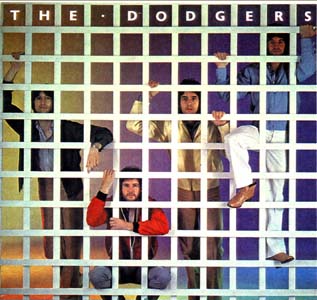

US: Polydor PD-1-6174
promo LP [ side
1 label /side
2 label ]
Side 1:
Love
On The Rebound (Wilson) [3:34]
vocals: John (plus Bob and Roger)
Little Darlin'
(Lomas) [2:49]
vocals: John (plus Bob and Roger)
Anytime (Wilson/Jackson)
[3:42]
vocals: John (plus Bob and Roger)
Come Out Fighting
(Jackson/Hooper)* [2:55]
vocals: John and Bob (plus Roger)
It Was You
(Jackson/Wilson) [2:32]
vocals: Bob and John
Mr. Music (Wilson)
[2:51]
vocals: John (plus John, Bob, Roger and Paul)
Side 2:
Don't
Know What You're Doing [version 2] (Jackson) [3:49]
vocals: Bob (plus John)
For Your Love
(Jackson) [3:48]
vocals: Bob (plus John and Roger)
I Call Your Name
(Jackson/Wilson) [3:17]
vocals: John and Bob
Take Another Piece
(Jackson) [2:21]
vocals: Bob (plus John and Roger)
Don't Let
Me Be Wrong [version 2] (Wilson) [2:24]
vocals: John (plus Bob, Roger and Paul)
All I Do (Wilson) [2:43]
vocals: Bob and John (plus John and Roger)
Das Ende (Jackson/Lomas) [1:05]
U.S. LP credits
*the original label accredited this track to Tommy Evans
incorrectly
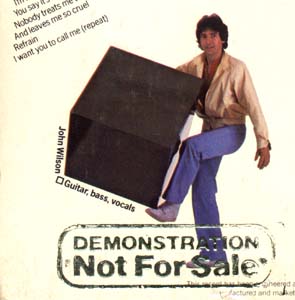
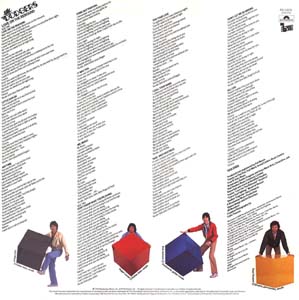
Love On The Rebound (Wilson) [3:35]/Love On The Rebound
(Wilson) [3:04] (both sides stereo)
US: Polydor PRO-061 (promo 12")
US: Polydor PD 14515 (promo 45) [ long
version label | short
version label ]
Love On The Rebound (Wilson) [3:35]/Come Out Fighting
USA on May 19, 1978 - Polydor 14515 [ side
A label | side
B label ]
UK: on Polydor 2059 028 [ PS
front | PS back
| side
A label | side
B label | Record
Mirror ad ]
Love On The Rebound promo film
Bob Jackson: I remember we spent a full day on it, and
(laughs) I'm ashamed to say that my only recollection of it is that I
was jumping on a trampoline. I don't remember much more than that.
TV
Bob Jackson: Tommy's brother [David] recently asked
me, "don't you remember that I came up to Manchester and we were talking
when you were in the TV studio?" I think it was with David Essex. He was
a British pop star. I did remember it vaguely, but I certainly didn't
remember a conversation with him. I know we did do at least one other
TV: that was "The Arrows" show. There was also "Supersonic" which was in
a theatre with a live audience and one we did in Holland in a circus
setting- a chimpanzee sat on the piano, facing me.
July-August, 1978: U.K. Tour and BBC Recordings. On this
tour the band performed for about one hour.
July 14, 1978: Kirk Levington Country Club, Cleveland
July 15, 1978: Rock Garden, Middlesborough
July 22, 1978: Big Bananas TV show (A.M.); Granary Club, Bristol
(10:45 PM)
July 24, 1978: Nutz Club, Swansea, South Wales
gig listings thanks to Keith James
Don't Let Me Be Wrong [version 2] (Wilson) [2:24]/Come Out
Fighting (Jackson/Hooper)* [2:58]
UK on August 04, 1978 - Polydor 2059 046 [ PS
front | PS
back | side
A label | side
B label ]
Get It
Together (aired: September 26, 1978)
(John
Wilson, Bob Jackson, Roger Lomas, Paul Hooper):
Don't Let Me Be Wrong [version 2] (Wilson)
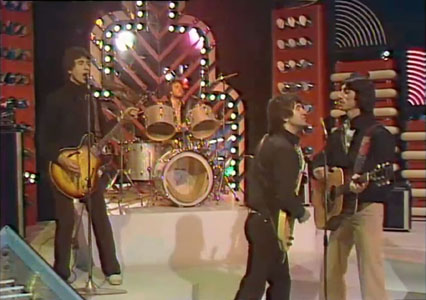
September-October, 1978: sporadic gigs at The Marquee (every 2 or 3
weeks)
Anytime (Wilson/Jackson) [3:46]/Little Darlin' (Lomas)
[2:51]
UK on November 17, 1978 - Polydor 2059 074 [ side
A label | side
B label ]
2nd
Dodgers LP
recorded at Rockfield Studios with producer (and engineer) Pat Moran
demos:
I Can't Live Without Your Love (Jackson)
See Me, See You (Jackson/Wilson)
All On You (demo)
Come Out Fighting (Jackson/Hooper) [demo remake of original]
Knock Down The Door (demo)
Roger
Lomas: "We recorded another album, but the record company
rejected it."
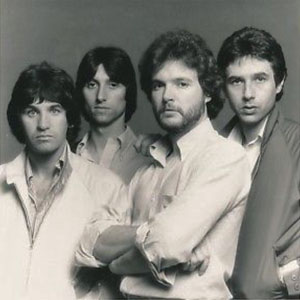
The Dodgers 'unreleased' 2nd LP album tracks as recorded on September 6,
1978 (or first
session for the LP on November 1, 1978?):
Stop Slow Down (Lomas?)
Don't Be Afraid (Jackson?)
Don't Do It (Wilson?)
New Day (Jackson)
One More Chance (Wilson?)
When I Look In Your Eyes (Jackson)
Once In Your Life (Wilson?)
Stuck On You? (Jackson/Wilson?)
Not Again (Jackson?)
Whatever You Do (Wilson?)
Crazy (Jackson)
No One Knows (Wilson?)
Tonight (Wilson?)
More And More (Jackson/Wilson)
Bob Jackson: I Can't Live Without
Your Love was one. I remember at one point Pat Moran said: "oh,
this could be a great single, if only we do this and this to it."
We're at Rockfield a week and a half, or two, or whatever it was and we
did a number of tracks. We would do basic backings and I think most of
the vocals were done, towards the end, but what happened was the manager
heard these rough mixes, they said: "we think the group is too poppy and
we like it when you do that Love On The Rebound kind of stuff."
Now I said: "If you want Foreigner, go and get Foreigner. If you don't
like the material, back off. This was the first time that I called an
ultimatum. I think John was happy to go along with it, because let's
face it, they were his songs. We had a meeting at one point where they
were arguing against certain tracks of mine, and I had a word with the
lads, and said, "you're either gonna back me up over this or not. I'm
bringing along songs; if you don't like them, we can just throw them
out; I'll write something else, but I don't want the management telling
me that they don't like something and therefore we're not doing it, you
know; I don't think we can be having that." And we had a meeting. We
told them straight. And they kind of went: "well, we're only advising
you." So it appeared to end amicably, but what I didn't realize was that
behind the scenes they were turning John and Roger to their point of
view. One of the managers insisted that he wanted to come down and do
the mixes. Can you believe this? This is a manager! He's not a producer.
We were nearing completion with some of them, but he insisted he was
gonna come down with Pat, and he didn't want us there. He did these
mixes, and they did end up very pared down, but I noticed when listening
to some of these mixes that some of the parts on them weren't mine, and
other parts that I had played just weren't there at all. In other words,
certain guitar parts and little bits of vocal had been replaced. When I
mentioned this to John, I said: "I'm sick of it, it's getting me down.
I've been listening to these tracks and they sound funny. It's almost
like these are not my parts." He looked very sheepish and he did the
typical: "come over here, let's have a drink - we need to have a talk."
He opened up and said: "look, I feel terrible; I've been keeping
something from you." Basically the whole thing I've told you about Tom
was now happening to me. They wanted me out of the group because I had
become increasingly more vocal about the change of direction. It was
because we were so far through the project, I think. If it had been
before the album had been started, they would probably have just tried
to kick me out or whatever. The other factor in all this is that they
made me sign away my future publishing with them, even though I was
still under contract to Island. I mean, some of the songs, for instance
Come Out Fighting which is credited to Paul Hooper, that's my
music, Paul wrote the lyric.
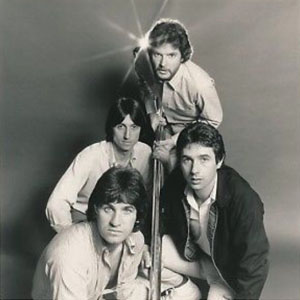
please e-mail any additions or corrections